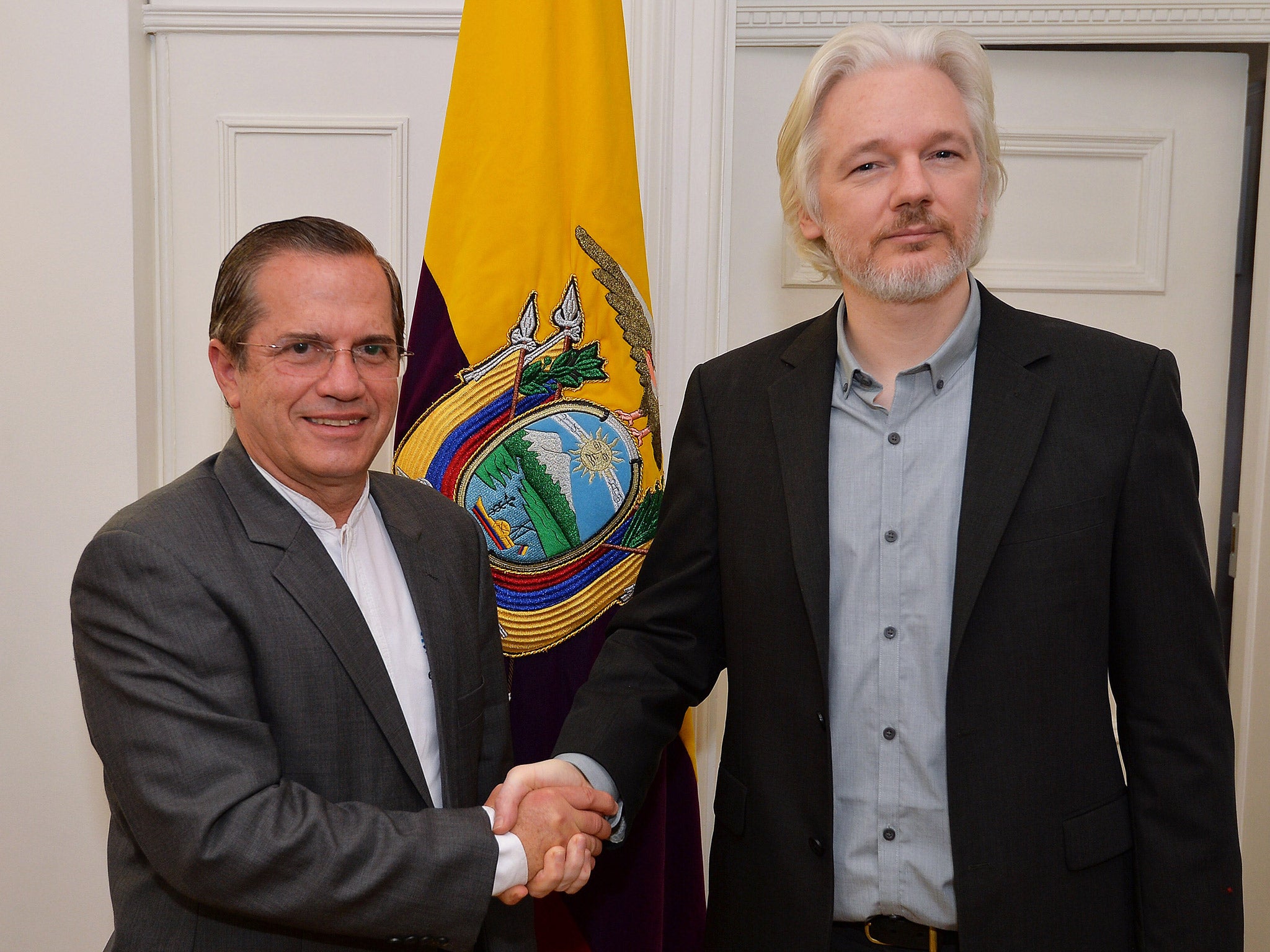Julian Assange: Met withdraws 24/7 police watch for Wikileaks founder at Ecuadorian Embassy
The force has maintained a permanent presence at the embassy in London since June 2012

The Met Police has stood down officers watching for Julian Assange outside the Ecuadorian Embassy for the first time since June 2012, saying the 24-hour presence of guards was "no longer proportionate".
The force has maintained a permanent, 24/7 police presence outside the building in London since Mr Assange entered it more than three years ago.
In a statement, the Met said the visible guards were being withdrawn in favour of a "covert" approach, and said the force "remains committed to executing the arrest warrant and presenting Julian Assange before the court".
The Wikileaks founder was arrested on suspicion of sexual offences in Sweden in December 2010, and his extradition was ordered. But Mr Assange failed to surrender to custody for removal to Sweden on 29 June 2012, instead seeking refuge at he Ecuadorian Embassy.
Figures published earlier this year showed the round-the-clock operation had cost British taxpayers more than £10 million, and in February the Met chief Sir Bernard Hogan-Howe admitted the surveillance was "sucking our resources".
This growing expense is understood to be behind the decision. Several senior Met Police officers have openly expressed frustration at the situation as government cuts hit policing budgets. Stronger private complaints have also been made to ministers, The Independent has been told.

Last summer, Mr Assange told reporters that the long period of confinement had caused his health to suffer, though he did not elaborate. Experts and doctors said such conditions would first and foremost raise concerns for a patient's mental health.
A Met spokesperson said today: "The operation to arrest Julian Assange does however continue and should he leave the Embassy the MPS will make every effort to arrest him. However it is no longer proportionate to commit officers to a permanent presence."
The force said it would not discuss details of the ongoing "covert" operation, but added that "a number of overt and covert tactics" would be used if Mr Assange were to leave the embassy.
"A significant amount of time has passed since Julian Assange entered the Embassy, and despite the efforts of many people there is no imminent prospect of a diplomatic or legal resolution to this issue," the Met said.
"Like all public services, MPS resources are finite. With so many different criminal, and other, threats to the city it protects, the current deployment of officers is no longer believed proportionate."
The Ecuadorean ambassador was summoned to the Foreign Office to discuss the case. “The head of the Diplomatic Service, Simon McDonald, registered once again our deep frustration at the protracted delay. The UK has been absolutely clear since June 2012 that we have a legal obligation to extradite Mr Assange to Sweden. That obligation remains,” a spokesman said.
Julian Assange: What happens next?
Given that he still faces arrest, Julian Assange is unlikely to venture out and about beyond the Ecuadorian embassy. In fact, little is likely to change immediately for Mr Assange.
He still needs to be careful on the embassy premises, as the embassy shares the building in Kensington, west London, with other tenants and officials are unable to stop police officers being inside the building.
It is likely that he will remain deprived of natural light for the foreseeable future, while Swedish and Ecuadorian negotiators thrash out a deal which enables the Swedish prosecutor to travel to London to interview him in the embassy.
Swedish diplomats reportedly expressed optimism that a deal will be done by Christmas, although Mr Assange’s lawyers will also need to agree on the circumstances of the interview. If the Swedish rape allegation does not proceed, he could still be arrested by police for breaching his bail conditions during the London extradition hearing in 2012, when he initially fled to the Ecuadorian embassy.
